Retire in Vietnam: The ultimate guide for a dream retirement
A retirement period represents both the cessation of work and the start of living independently according to personal preferences. The liberating freedom of post-retirement could not be better experienced anywhere than in Vietnam. Retirement seekers are increasingly migrating to Vietnam because its breathtaking landscapes and welcoming culture and unbelievably low expenses make it a world-renowned retirement haven.
In Da Nang, residents can savor Vietnamese coffee while gazing at the ocean from their balconies, just as people in Hoi An enjoy strolling through streets illuminated by lanterns. The possibilities are endless!
This guide provides all essential guidance about living in Vietnam during retirement including budget information and immigration rules as well as description of healthcare services and property market and cultural integration details.
- The allure of retiring in Vietnam
- Best places to retire in Vietnam
- Visa and legal requirements for retirees
- Healthcare and medical facilities
- Housing and real estate for retirees
- Banking and finances in Vietnam
- Leisure and recreational activities
- Common challenges and how to overcome them
- FAQs about retiring in Vietnam
- Conclusion: Retiring in Vietnam
The allure of retiring in Vietnam
Cost of living: A retiree’s dream
One of the most compelling reasons retirees are choosing Vietnam is its affordability. Living comfortably on a modest pension is not only possible - it’s easy. Let’s take a look at the estimated monthly costs for a retiree in Vietnam:
|
Expense |
Estimated Cost (USD) |
|
Rent (1-bedroom apartment in city center) |
$300 - $600 |
|
Utilities (electricity, water, internet) |
$50 - $100 |
|
Groceries |
$150 - $300 |
|
Eating Out |
$100 - $250 |
|
Transportation |
$30 - $50 |
|
Health Insurance |
$50 - $200 |
Compared to many Western countries, these costs are significantly lower. A retiree can live a comfortable, even luxurious, life in Vietnam for as little as $1,000 to $1,500 per month.
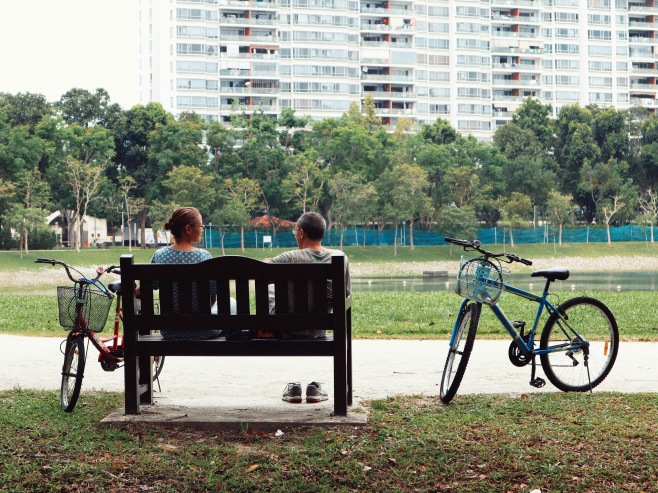
Vietnam among cheapest countries to retire around the world
Vietnam’s natural beauty and climate
The country of Vietnam presents visitors with multiple breathtaking landscapes which span from one extreme to another. Every retirees in Vietnam can discover their ideal scene among the tropical shoreline of Nha Trang or the misty mountain terrain of Da Lat or the engaging urban streets of Ho Chi Minh City.
The climate varies by region:
- North Vietnam (Hanoi, Sapa): Four seasons, with hot summers and cool winters.
- Central Vietnam (Da Nang, Hoi An): Warm and sunny most of the year, with occasional typhoons.
- South Vietnam (Ho Chi Minh City, Mekong Delta): Tropical climate, hot and humid year-round.
Warm and welcoming culture
The people of Vietnam are well known for how hospitable they are to others. The Vietnamese cultural tradition of respecting elders creates an ideal environment where retirees can experience social integration and appreciation throughout the community.
Best places to retire in Vietnam
Da Nang: The perfect balance
Da Nang maintains a combination of contemporary facilities and visual splendor. The city stands among Vietnam's premier retirement locations because it features clean beaches and established infrastructure together with an inviting foreign community.
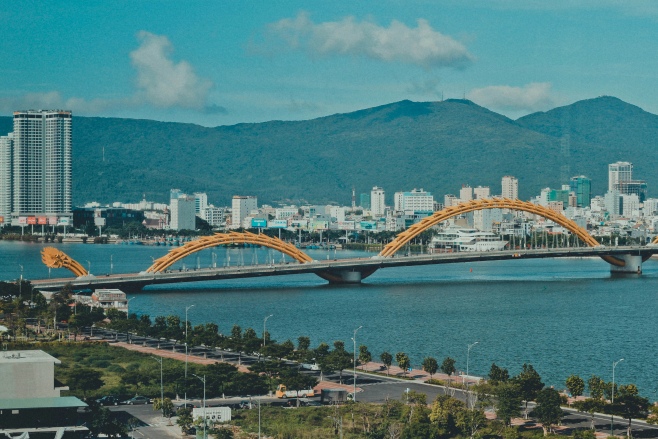
Da Nang City
Ho Chi Minh City: Vibrant and energetic
For retirees seeking an urban lifestyle, Ho Chi Minh City is an ideal choice. The city provides first-class medical services alongside gourmet dining venues together with an endless series of recreational choices.
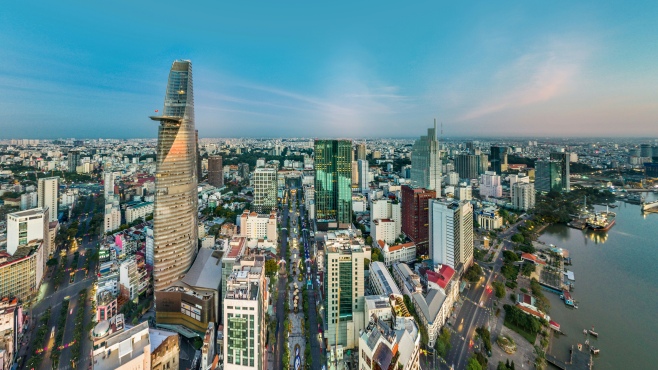
Ho Chi Minh City
Hanoi: A cultural gem
Those who seek historical appeal combined with contemporary features should consider moving to Hanoi. The combination of French colonial buildings with tranquil lakes and active street markets produces a magical atmosphere in this location.
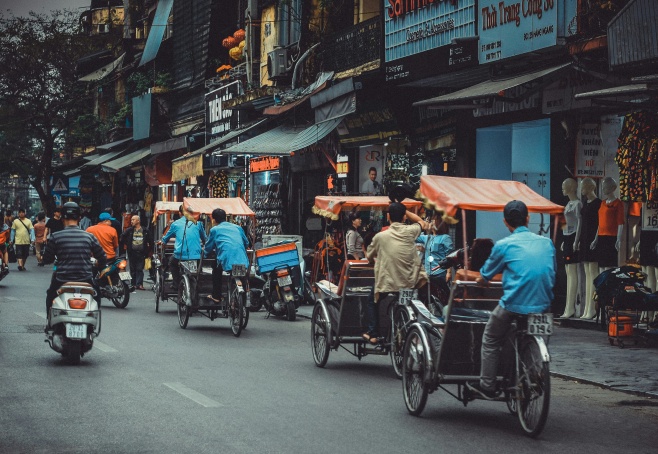
Hanoi Old Quarter
Hoi An: A peaceful, scenic town
Hoi An offers retirees a perfect retirement destination because of its relaxed way of life and beautiful landscapes combined with welcoming people. The city maintains its well-preserved ancient town while its peaceful countryside encompasses a distinctive way of life.
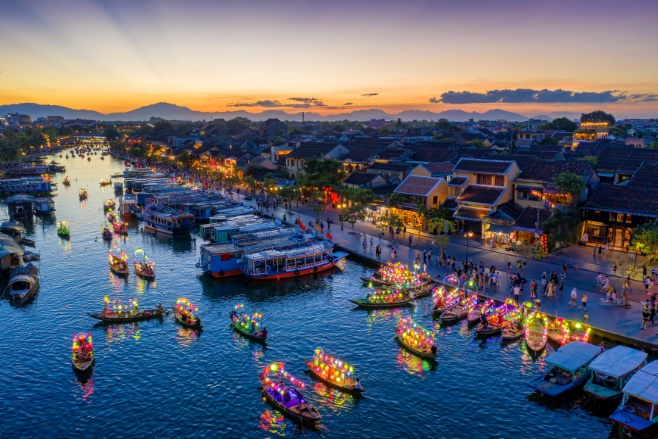
Hoi An Ancient Town
Nha Trang: Coastal paradise
Ocean enthusiasts will find their paradise in Nha Trang due to its picturesque beaches alongside a relaxed environment and budget-friendly cost of living.
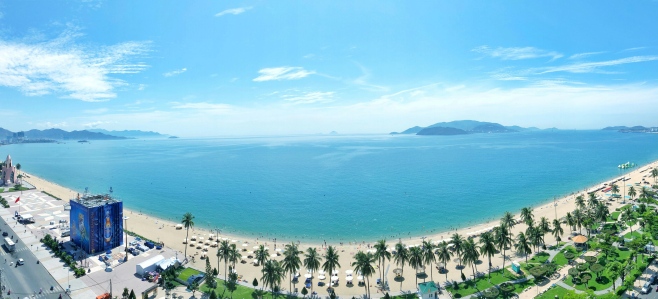
The Beauty of Nha Trang Beach City, Vietnam
Visa and legal requirements for retirees
Types of visas for retirees
Foreign nationals can maintain long-term residence in Vietnam through different visa types even though the country does not have a dedicated retirement visa program.
- Tourist Visa: Valid for 1-3 months, extendable. Retirees commonly leave the country to perform visa runs in neighboring territories to maintain their prolonged stay.
- Business Visa (DN Visa): Requires sponsorship from a Vietnamese company; valid for 3-12 months.
- Temporary Residence Card (TRC): Serves investors and foreign workers and spouses of Vietnamese nationals for up to five years of validity.
- Investor Visa (ĐT Visa): Foreign individuals who invest at least $120,000 (3 billion VND) in a Vietnamese business can obtain the Investor Visa (ĐT Visa) which allows them to stay between 1 and 5 years.
- Marriage Visa: Retired individuals who marry Vietnamese citizens can get a 5-year temporary residence card through a marriage visa.
- Work Permit & Labor Visa (LD Visa): Retired individuals who teach English for part-time employment can obtain a Work Permit & Labor Visa (LD Visa) in Vietnam.
Long-term stay options
Retirees often opt for multiple-entry visas, which allow them to stay long-term by renewing or doing visa runs. Some apply for temporary residence cards if they qualify.
Necessary documentation
Required documents typically include:
- Passport with at least 6 months validity
- Proof of financial stability
- Visa application form
- Health insurance (sometimes required)
Healthcare and medical facilities
- Quality of healthcare in Vietnam
Vietnam has a mix of public and private healthcare facilities. While public hospitals can be overcrowded, private hospitals in major cities offer excellent care at affordable prices.
- Affordable medical services
A consultation with a specialist in a private hospital costs around $20-$50, while minor surgeries can be 60-70% cheaper than in Western countries.
- Health insurance for expats
It’s advisable to get international health insurance, which costs around $500-$1,500 per year, depending on coverage.
Housing and real estate for retirees
Renting vs buying a property
- Renting: Flexible and affordable ($300-$600 per month for a one-bedroom apartment).
- Buying: Foreigners have the right to buy apartments while they do not possess the right to acquire land. The modern apartment market in Ho Chi Minh City and Hanoi spans between $2,000 and $5,000 per square meter but Da Nang and Nha Trang show prices between $1,500 and $3,000 per square meter. The price of luxury condos in desirable neighborhoods starts at $100,000 and extends to more than $500,000 based on their dimensions and additional features.
Best areas for expats
Popular expat-friendly areas include:
- District 2 & 7 in Ho Chi Minh City
- Tay Ho in Hanoi
- An Thuong in Da Nang
Banking and finances in Vietnam
- Setting up a bank account
Foreigners can open accounts with banks like Vietcombank, Techcombank and HSBC Vietnam.
- Managing money as an expat
International transfers and online banking are common, but cash is still widely used.
- Taxes and financial considerations
Foreign retirees are generally not taxed on income earned abroad.
Leisure and recreational activities
Outdoor activities
- Hiking in Sapa
- Beach lounging in Phu Quoc
- Motorbike tours through the countryside
Social clubs and expat communities
There are many expat groups where retirees can connect and make friends.
Common challenges and how to overcome them
- Language and communication issues
Learning basic Vietnamese phrases can be helpful, but English is spoken in major cities.
- Adjusting to the climate
Some retirees find the humidity challenging but adapt over time.
- Bureaucratic hurdles
Visa regulations can be tricky, so consulting a visa agency is recommended.

Retirement in Vietnam: Why it's the perfect place to retire
FAQs about retiring in Vietnam
- Can foreigners own property in Vietnam?
Foreign citizens possess the right to buy apartments but they cannot purchase land in Vietnam.
- Is Vietnam a safe place to retire?
The security situation in Vietnam remains positive since violent crime rates stay minimal throughout the country.
- What are the healthcare costs for retirees?
Private medical facilities in Vietnam offer affordable doctor appointments ranging between $20 and $50.
- Do I need to learn Vietnamese to live comfortably?
Learning basic Vietnamese phrases will be beneficial in daily life but it is not necessary for survival.
- What is the best city in Vietnam for retirement?
Da Nang together with Hoi An represent the ideal options due to their combined affordability and visual appeal along with accessibility.
- How do I meet other retirees and expats in Vietnam?
The best way to meet other retirees and expats in Vietnam involves joining expat Facebook groups while participating in social events and joining local clubs.
Conclusion: Retiring in Vietnam
The retirement opportunity in Vietnam allows seniors to experience comfort at reduced expense levels. Vietnam functions as an ideal retirement location because it delivers friendly local culture and scenic beauty paired with affordable health services. Vietnam contains regions which fit the needs of people who want either beachside tranquility or city exploration.
Related Articles
- Grab and Taxi in Vietnam: Best transport options for visitors
- Ha Giang in Vietnam: Breathtaking loops & nature’s majesty
- Bun Cha Hanoi – Authentic Taste of Vietnam’s Iconic Dish
- Custom In Vietnam: A deep dive into Vietnamese traditions
- Retire in Vietnam: The ultimate guide for a dream retirement
- Trang An, Vietnam: A journey through Vietnam's natural wonder
- Vietnam Metro: The future of urban transportation in Vietnam
- Main districts of Ho Chi Minh city: Iconic landmarks & travel map
HOW CAN WE HELP?
APPLY WITH CONFIDENCE










